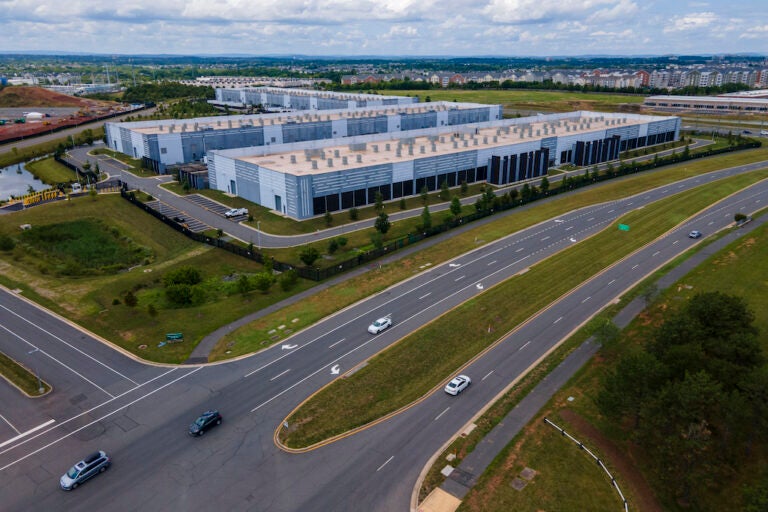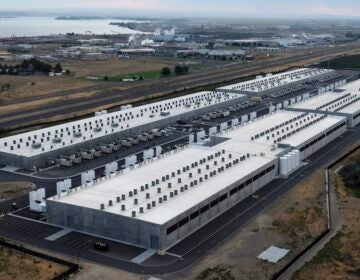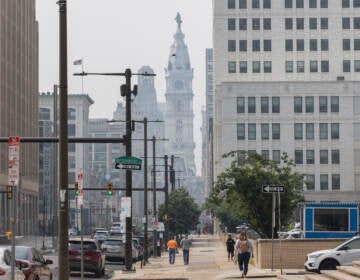Pennsylvania legislation aims to protect ratepayers from data center energy strain
The legislation would allow the Pennsylvania Public Utility Commission to create a regulatory framework for data centers.
Listen 1:13
Data centers are in Ashburn in Loudon County, Virginia, on Sunday, July 16, 2023. The centers house the computer servers and hardware required to support modern internet use, including artificial intelligence. The county is home to the world's largest concentration of data centers. (AP Photo/Ted Shaffrey)
This story is part of the WHYY News Climate Desk, bringing you news and solutions for our changing region.
From the Poconos to the Jersey Shore to the mouth of the Delaware Bay, what do you want to know about climate change? What would you like us to cover? Get in touch.
As developers and tech companies seize the potential to build power-hungry data centers in Pennsylvania, state lawmakers are considering legislation that aims to protect ratepayers from increased energy bills.
Several data centers have been planned or proposed in Pennsylvania, including a 1 million-square-foot Amazon facility in Bucks County, but the state has yet to adopt standards for the facilities.
Data center proponents are touting the prospect of increased tax revenue and job creation. However, as utility bills continue to soar in the region, residents are concerned a strain on the power grid could mean higher electric bills.
On Wednesday, lawmakers and stakeholders discussed proposed legislation that would allow the Pennsylvania Public Utility Commission to create a regulatory framework for data centers in the state. The commission oversees public utilities and aims to ensure reasonable prices for ratepayers.
The proposed legislation, HB1834, sponsored by state Rep. Robert Matzie, D-Beaver, would direct the commission to draft regulations that aim to protect ratepayers from soaring energy costs associated with data center development.
“I personally support data centers,” Matzie said during the hearing. “I believe it’s our role as policymakers to ensure we have policies in place that make sense, promulgate some regs early from a temporary perspective and then move forward.”
The data center boom
Data centers house the computer servers required to run internet services worldwide.
While they have been around since the mid-20th century, the acceleration of power-hungry artificial intelligence has boosted demand for larger sites and more resources.
In July, the Trump administration announced plans to accelerate AI development with limited regulatory oversight. A month earlier, Pennsylvania Gov. Josh Shapiro announced his support for Amazon’s $20 billion investment in developing data centers across the state.
Data centers use a significant amount of energy and as AI requires more power at a faster rate than typical internet activities, data centers often strain the power grid, leading to increased electricity rates for consumers.
PJM Interconnection, which manages the region’s electrical grid, has pointed to the increase in data centers as a reason for strains on the grid.
Residents in the region have already been hit with increased energy bills, and PJM’s recent capacity auction — where power plants bid for rates in exchange for guaranteeing future supplies — resulted in an expectation that those rates will rise another 1.5% to 5%.
Though a 2023 Department of Energy study said data centers amount to less than 5% of annual electricity use in the U.S., the same report indicates data centers will consume 6.7% to 12% of total U.S. electricity by 2028.
Mitigating data center impacts
Matzie’s proposed legislation would allow the PUC to evaluate whether data center contracts impact the PJM grid, as well as ratepayers. During the hearing, PUC Chairman Stephen DeFrank expressed his support for the legislation.
“I’m confident that with prudent planning, large load customers such as data centers can be integrated into the electric grid in a manner that benefits utility customers, local municipalities and Pennsylvania as a whole,” he said. “Mandating the commission [to] establish uniform and binding rules for large load interconnection will help mitigate excessive competition among utilities and a potential race to the bottom.”
The legislation would also prohibit public utilities from turning to ratepayers to recover the costs associated with the provision of electric service to commercial data centers, or costs that otherwise would not be incurred without the electricity demand of the commercial data center.
In addition, they would be required to ensure that at least 25% of the electricity it supplies under a contract is generated from renewable energy sources. Several stakeholders who testified during the hearing voiced concern that such a mandate would challenge energy affordability.
DeFrank, who suggested some changes to the bill’s language, also cautioned against the provision and suggested that greater flexibility around power procurement would help energy reliability.
Dan Diorio, vice president of state policy for the Data Center Coalition, said the mandate would prevent the industry from deploying its capital for clean energy. He also called the language of the bill “prescriptive” and said it would lead to inflexibility.
“HB1834 imposes disparate treatment on the data center industry without verifiable cost-based reasoning,” Diorio said.
Supporters of the legislation praised other areas of the bill that aim to protect ratepayers, including a provision that would require the PUC to consider the curtailment of some or all of a commercial data center’s load during emergency conditions.
Pennsylvania Consumer Advocate Darryl Lawrence said the legislation is “necessary to mitigate potential price increases.” However, he added more is needed to protect existing consumers from blackouts caused by data center demand exceeding available supply.
The legislation would also require data centers to fork out money based on peak demand for a proposed fund that would enhance the Low-Income Home Energy Assistance Program.
Known as LIHEAP, the federally-funded program provides financial assistance to help low-income households pay their energy bills. Data centers that use 100 megawatts or more would be responsible for $500,000 per year.
Patrick Cicero, an attorney with the Pennsylvania Utility Law Project and the former consumer advocate, called the dollar amounts “woefully inadequate.”
“These are trillion dollar companies, they can afford millions of dollars to contribute to LIHEAP,” he said.

Get daily updates from WHYY News!
WHYY is your source for fact-based, in-depth journalism and information. As a nonprofit organization, we rely on financial support from readers like you. Please give today.







